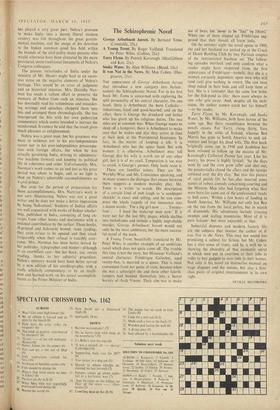The Schizophrenic Novel
George Arbuthnott Jarrett. By Bernard Toms. (Constable, 25s.) A Young Trout. By Roger Vailland. Translated by Peter Wiles. (Collins, 21s.) Snake Water. By Alan Williams. (Blond, 18s.)
THE appearance of George Arbuthnot: Jarrett may introduce a new category into fiction: namely the Schizophrenic Novel. For in his first book Mr. Toms is concerned with exploring the split personality of his central character. On one hand, there is Arbuthnott the born Catholic- industrious, loyal and good-hearted; and on the uther, there is George the drunkard and lecher who has given up his religious duties. The two sides are at constant war. When George wants to sleep off a hangover, there is Arbuthnott to make sure that he wakes and that they arrive in time at their desk at the Providential Insurance. In fact, in the matter of keeping a job, it is Arbuthnott who has the upper hand. But with women it is otherwise.. Arbuthnott may (ell George that his wife is worth ten of any' other girl, but it is of no avail. Temptation is too nice to avoid, is George's answer. Only fools resist it.
These are familiar voices. They are Mr. Worldly-Wise and Mr. Conscience speaking, and ill many respects the dialogue that ensues between them suggests .a modern morality play. Mr. Toms is a writer to watch. His description of a certain kind of pub laugh as 'a sandpaper chuckle' is exact and telling, and he can com- . press the whole tragedy of lost innocence into a dozen words: 'I'm a big girl now . . . Twenty- four . . . I need the make-up man now.' If it were not for the last fifty pages, which decline into melodrama and include a highly improbable murder, George Arbuthnot: Jarrett would not only be the most ambitious, but the most success- ful novel of the week.
A Young Trout, beautifully translated by Mr. Peter Wiles, is another example of an ambitious novel which does not quite come off. The trouble this time is'not the story, but Monsieur Vailland's central character. Frederique Galuchat, aged twenty-five, is married to a queer. This is most convenient from her point of view, because when she was a schoolgirl• she and three other fourth- formers had banded themselves into a Secret Society of Arch Vixens. Their aim was to make
use of boys, but 'never to be "had" by [them].' When one of them slipped up, Frederique sug- gested that they should all learn judo.
On the summer night the novel opens in 1960, she and her husband are picked up at the Crack of Dawn Bowling Club by two Parisian couples of the international business set. The follow- ing episodes interlock and only confirm what a reader might have suspected from the first appearance of Freddrique-namely, that she is a woman curiously dependent upon men who will (and can) give nothing in return. She can even sleep naked in their beds and still keep them at bay. She is a reminder that the same law holds for the fish-pond as life: there must always be one who gets away. And, despite all his tech- nique, the author cannot catch her for himself -or the reader.
Tarry Flynn, by Mr. Kavanagh, and Snake Water, by Mr. Williams, both have heroes of the same age. But there resemblance between the novels ceases. For Tarry, rising thirty, lives happily in the wilds of Ireland, whereas Ben Morris has gone to South America to seek ad- venture and forget his dead wife. The first book 'originally came out in 1948 and doubtless has been reissued to follow up the success of Mr. Kavanagh's Collected Poems last year. Like his poetry, his prose is highly lyrical: `So the days went by and the corn grew taller and shot out, the potato-stalks closed the alleys and the turnips softened over the dry clay.' But into this picture of rural parish life he has also inserted some scenes of robust comedy concerning courting and the Mission. Men who had forgotten what they were born for came out of the confessional 'ready to bull.cows.' Within a few hours of landing in South America, Mr. Williams not only has Ben on the run from the local police, but in search of diamonds. His adventures include crossing swamps and scaling mountains. Most of it is pure hokum -but most enjoyable at that.
Industrial disputes and modern factory life are the subjects that interest the author of It was Not in the News. This may not sound too promising a subject for fiction, but Mr. Cohen has a nice sense of irony, and he is well up to showing the absurdity of that economic spiral in which men put in overtime at their jobs in order to buy gadgets to save time in their homes. Not only is his novel an instructive manual on wage disputes and the unions, but also a first- class piece of original entertainment in its own right.
NI \III E BRAYBROOKE


































 Previous page
Previous page